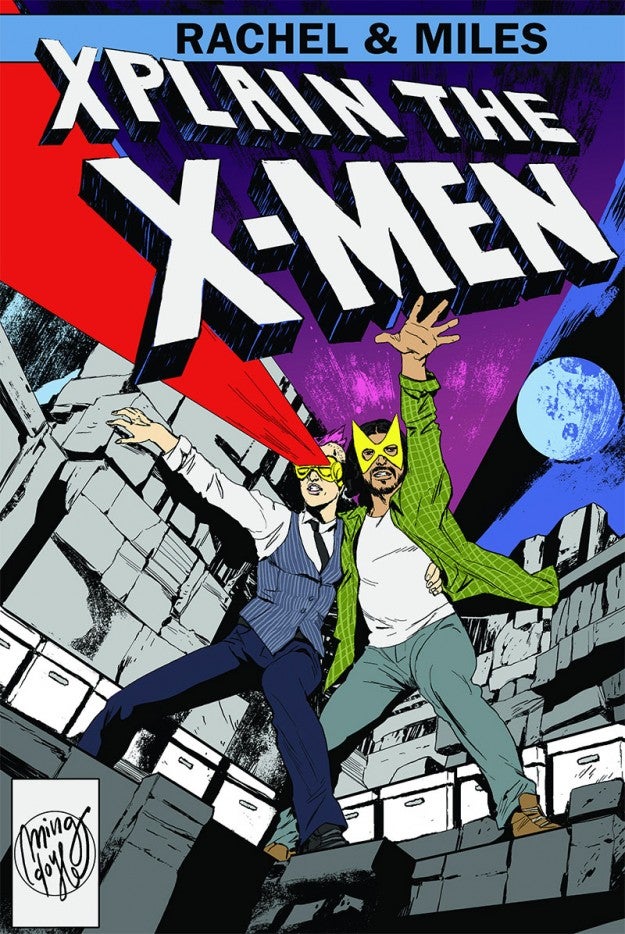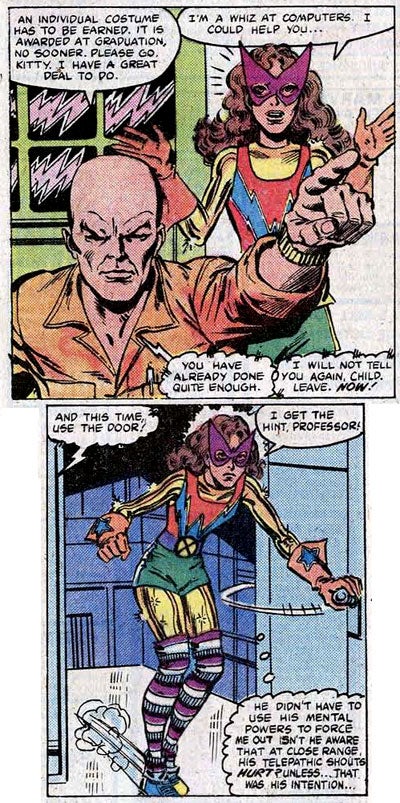X-Men: Days of Future Past managed the impressive feat of taking a sprawling web of dystopian time-travel comics and simplifying them into a single two-hour movie.
Unlike several of its prequels, Days of Future Past has been met with a very positive reception from X-Men fans. Despite the many liberties it took with the original storyline, it has an excellent grasp of the intense, slightly over-the-top tone of the comics. It’s an unabashedly ridiculous film, gleefully delving into multiple timelines and a ton of operatic melodrama, all while dealing with such serious topics as mutant genocide.
The downside is that while this movie is a great advertisement for the comics, it’s difficult to know where to start reading. The Internet is full of top 10 lists and primers for every superhero comic under the sun, but X-Men is a more difficult case. There are more characters than Game of Thrones, it’s been running for decades, and there isn’t really a single origin story you can pick up at a glance.
Rachel and Miles X-Plain the X-Men is a weekly podcast by two X-Men fans who know the comics inside and out. It aims to give listeners a (hilarious) crash course in X-Men canon, from Stan Lee’s 1960s bombast to the heavily bowdlerized children’s TV cartoons of the ’90s, to the modern sci-fi soap opera that fans know and love today. We Skyped the show’s hosts to find out the story behind X-Plain the X-Men.

Illustration by Ming Doyle/Tumblr
Rachel Edidin and Miles Stokes both work in the comics industry: He works in IT at Dark Horse Comics, and she freelances as an editor and geek culture journalist. As any listener will quickly realize, their love of X-Men runs deep and true.
“One of my earliest memories is my father reading me X-Factor #4 as a bedtime story,” says Miles. (We’ll refer to them by their first names throughout for clarity’s sake.) “I didn’t know what the hell was going on, just that there were all these crazy characters with bright costumes and lots of drama and big fights. Years later, once I’d become a heavy reader, my father gave me a longbox full of like every X-Men anything he could find from the ’80s, and I dove into that and basically just lived there for a couple of years.”
Rachel, on the other hand, got into comics relatively late.
“I read comics really sporadically growing up,” she tells us. “I got very into Vertigo in high school, and largely got into superhero comics through a couple of friendships, one of which was with Miles. We’ve known each other since we were like 12, and a lot of our friendship was built on trading books back and forth. Like, we made friends over having the same favorite books, and eventually comics came into that. We moved in together in college, and at some point he started telling me the Dark Phoenix Saga as a bedtime story. That summer we brought up a bunch of his old comics and his dad’s old comics, and I spent a summer basically reading straight through 30 years of X-Men, at which point I was completely hooked.
One of the first things new readers pick up on is that X-Men comics are full of crazy, often nonsensical plot twists—even more so back in the old days, when superhero comics felt less pressure to be “adult.”
Part of being an X-Men fan is developing a love and acceptance for this combination of heavy subject-matter and total ludicrousness, which is something that comes across immediately in Rachel and Miles X-Plain the X-Men.
“We’ve been joking about, you know, explaining the X-Men being the thing we do for years, just because we’re both really into the weird, ridiculous soap opera minutiae of it,” says Rachel.
Each episode opens with one of the hosts attempting to explain some piece of canon esoterica, only for the explanation to degenerate into wildly conflicting strands of X-Men continuity—at which point the other host admits defeat and yells, “WHAT!?” in horrified bewilderment. Nothing in X-Men comics is ever simple, but the good news is that it’s almost always hilarious (although sometimes unintentionally so).
The first episode covers the early years of X-Men, back when Magneto superpowers literally included “magnetic personality” and continuity was borderline nonexistent. Most fans are unlikely to delve into these 1960s Silver Age comics, which is where Rachel and Miles come in. We may not ever feel the need to read those storylines ourselves, but that doesn’t stop them from being interesting at a distance.
“I don’t think people really need to read the Silver Age to get X-Men,” says Miles, “but I think from where we’re starting right now in the last couple of episodes, we’ve got to the Bronze Age, I would love it if our enthusiasm was contagious enough for people to just jump in and buy the old cheap newsprint volumes of X-Men and read everything we’re talking about. We love this stuff so much that for me, if we can get people to find the same appeal that we do on our own, based on our enthusiasm, then I think we’ve absolutely succeeded.”
There’s also a certain subtext to the idea of helping new fans get up to speed on X-Men canon: the odious concept of “fake geek girls.”
Developing a serious breadth of X-Men knowledge is incredibly time-consuming, so in this fandom there’s even more potential for a noticeable divide between old and new fans. With a resource like X-Plain the X-Men, newer or more casual fans can still learn about esoteric details from old comics, even if they don’t have the time or inclination to look it up themselves. Either way, Rachel and Miles both agree that this contempt for so-called “fake fans” is just plain idiotic.
“I’ve written about this a lot,” says Rachel. “I’ve talked about this a lot, the idea of there being thresholds for being a real fan or a real geek being kind of awful and stupid. And hopefully, being able to break that down a little bit would be nice.
“I’m one of those people who enjoys Television Without Pity summaries more than actual television shows, so… I can definitely see preferring to hear people talk quickly through this stuff than actually read 30 years of comics. I’m a completist, I love minutiae, that’s a point of entry for me. And I know it isn’t for everybody, so I think the idea is both to explain the stuff and give people the Cliff’s Notes version, but also to make it accessible.”
“As long as somebody likes X-Men in any regard,” adds Miles, “they’re an X-Men fan. If they’ve just listened to an episode of our podcast, or if they’ve read every single of the thousands of X-Men related issues. Like, either way they count. For me at least, I kinda like the idea of us having at least some listeners who are getting all of their X-Men knowledge just from our back-and-forth yelling and laughing conversations.”
These days, most new X-Men fans are coming to the comics via the movies, or at least with a passing awareness of movie canon. And oh boy, does that lead to some surprises when you start learning about how the original characters differ from the movie cast.
One running joke in X-Plain the X-Men is that while the Patrick Stewart version of old Charles Xavier comes across as an avuncular mentor figure, in the comics he is basically… a dick. He’s just a total douche. In fact, Rachel argues that there’s a case to be made for Professor X being an actual supervillain.
Rachel: The thing about Professor X is he’s one of those “villains through good intentions” characters. In the comic he’s the most powerful telepath in the world, and what that means is that on a functional level, he has two options, which are to be on guard continually and be very very careful in everything he does, or inadvertently mind-control people.
A lot of the stuff that he does that’s really awful, especially in the Silver Age, he does with a sort of cheerfully benign paternalism. “Oh, I’ll just wipe away that memory, and then you’ll be happier!” “Oh, I’ll just get rid of your memory of being evil!” “Oh, I’ll just influence you a little bit, everything’ll work out for the better.”
And the thing is, because he’s one of the heroes, it’s something that I don’t think was written to be creepy, but it really, really is. That got picked up on a lot more later. For me, the Professor X moral event horizon is midway through [Chris] Claremont’s run specifically, when he hooks up with a woman who he met when she was his psychiatric patient and catatonic, which… yeah. Which is a thing that he definitely did!
Miles: That is canon; that’s definitely true.
Rachel: That’s Legion’s mom!
Miles: See, I think Professor X being kind of a morally gray… kind of a dick sometimes, basically… I think it’s kinda cool. One of the things I keep coming back to again and again is that for me, X-Men is about Xavier’s dream versus Magneto’s dream, the opposition between their two perspectives.
I like how Magneto is just, you know, he’s not an unambiguous villain. He has heroic qualities to him even if he does terrible things, but his intentions are really good, certainly. At least at their baseline, if not as they get more elaborate. And I like Xavier too—he’s the sympathetic guy because he’s the one who’s the X in X-Men, he’s the one who made the team we’re reading about, but he also does these not-OK things. I think once the book becomes more self-aware in the Bronze Age and onward and it starts addressing that, it’s really, really effective. In the Silver Age, he’s just this hilarious asshole.
Rachel: Oh yeah, he’s horrible. And even beyond the telepathic stuff, he is just an unapologetic dick in the Silver Age. But in terms of the telepathic stuff, like Miles said, I think both Xavier and Magneto are interesting because they’re studies in doing the wrong things for the right reasons.

Photo via comicsoughtabefun/Tumblr
When we asked Rachel and Miles about other significant differences between the movies and comics canon, the answer was unanimous: Wolverine. Specifically, that the movies are just way too obsessed with him.
Rachel: Wolverine’s not the main character.
Miles: You know, honestly that sounds flippant, but I think that’s a big, big part of it.
Rachel: Yeah, X-Men is an ensemble book.
Miles: That’s the core appeal of X-Men, aside from the central metaphor. It’s the fact that it’s this team, this almost family. It’s all about their dynamics and you know, how each of them interact with each other of them, as opposed to the movies, where it’s like, What’s Up With Wolverine, and what are each of these characters’ relationships to Wolverine.
Rachel: With the exception of [2011 movie] First Class.
Miles: Well, yeah, with the obvious exception of First Class, where he’s in about three seconds of it. I think part of it is the simple fact that Fox doesn’t have the rights to the Marvel Universe, and so in the comics, the X-Men definitely exist in this gigantic, insane universe with like, superscience and magic and aliens and all of this crazy stuff.
Then in the X-Men movies you don’t have that, so you could never do like the real Dark Phoenix Saga, because you can’t do all this, like, space alien stuff; it just wouldn’t fit the tone because it hasn’t been pre-established in you know, Silver Surfer or Fantastic Four or whatever. You just have the central metaphor of what mutants are, and, you know, some fighting. And now they’re introducing time travel, which I think is very exciting because I love the hell out of time travel; it just makes it really over-the-top and wonderful. But yeah, the lack of context in the Marvel Universe, the lack of understanding X-Men as an ensemble… What else do you think, Rachel?
Rachel: Well, it simplifies the concept, and it simplifies the context a lot, but that’s going to be true in any adaptation. The two things that I really really want from any X-Men movie are for it to be really character-driven, and for it to be a really cool and fun superhero story. And I want those things at the same time.
The first two X-Men movies were really character-driven, but they weren’t really superhero stories in traditional ways. They just didn’t really have that. Last Stand had some of that, but it was a godawful mess. First Class was again very character-focused, but really not a superhero thing. Days of Future Past is both, and I was really glad to see that finally start to click.
•••
Rachel and Miles X-Plain the X-Men is now up to its ninth episode. Earlier episodes of note include the Days of Future Past tie-in, and the Cyclops episode co-hosted by author Greg Rucka. But you should really start at the beginning, if just to hear more about Magneto’s magnetic personality.
Since they first started broadcasting back in April, Rachel and Miles have built up something of a fanbase of their own, encompassing everyone from industry professionals (so much great fanart!) to people who knew nothing about X-Men at all. So whatever your exposure, you’ll probably feel right at home.
Image via Ming Doyle/Tumblr


